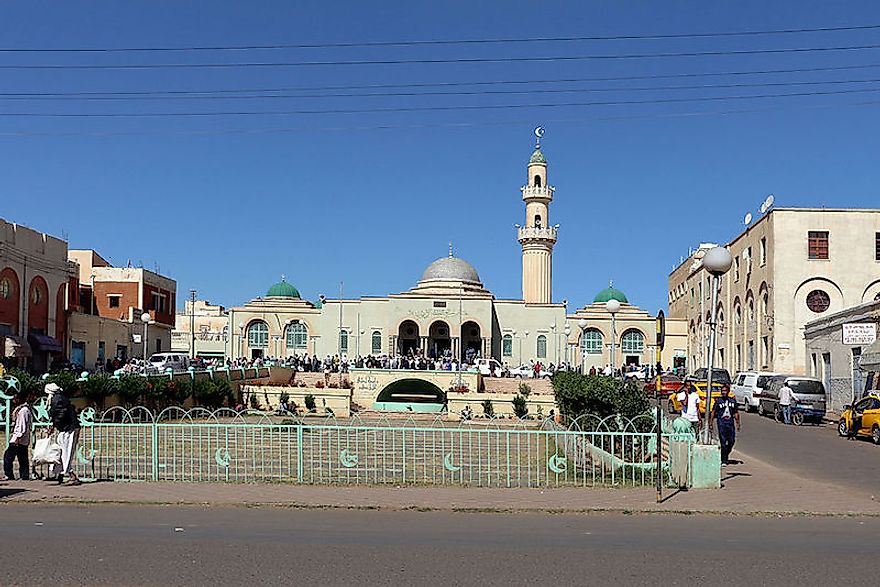Religious Faith And Persecution In Eritrea

Eritrean Orthodox Christianity and Sunni Islam are the largest denominations in the country, with persecution seen among minority churches like Jehovah Witness, independent non-Evangelical churches, and Wahabi Islam. With the Orthodox Christianity and Sunni Islam as the main religious groups in the country, other faiths, especially the newly established face a hard time surviving in the conservative environment in Eritrea. The churches are allowed to register only through a lengthy process that entails revealing individual data of members.
Eritrean Orthodox Christian
The Orthodox Christian is the largest Christian group in Eritrea with a 51% hold on the total population. The church dominates the highlands part of Eritrea among the Tigrinya people who are majorly Christians and is known as the Orthodox Tewahedo Church.Unlike other countries where the Europeans introduced Christianity, Eritrea is different. As early as the 4th century, the first Syrians from the Mediterranean docked at the coast of Eritrea and introduced Christianity. The religion grew and spread all over the coastal plains and the highlands with less resistance. Today the church operates with fewer restrictions and the Christians can run their daily lives without fear of persecution, but the government still dictates the church operations and decisions.
Sunni Islam
Sunni Islam accounts for 42% of the Eritrean population which is 99% of the total Eritrean Muslims. These Sunni Muslims differ from other Muslims in that they believe in the companions of Muhammad who compiled the Quran. The religion goes way back to the 7th century when disagreements of Muhammad’s Successor arose. The Sunni Muslims believed in the Muslim Community responsibilities in selecting a Caliph while their brothers the Shi’a believed that the prophet chose Ali, his son in law as the successor. Today the Sunni Muslim exists in countries like Iraq, Iran, Yemen, and Bahrain.
The Suni believes in the six pillars of Islam like all other Muslims. They believe in Tawhid, the existence of the angels of God, the authority of the books of God, follow the prophets of God, believe in the Day of Judgment, and the Supremacy of God’s will. In Eritrea, they inhabit the areas of Eastern, coastal and western lowlands. Most of the believers are from the Tigre, Saho, Beja, Bilen, and Rashaida ethnic communities. Some Nilo-Saharans and Kunama Nilotes also practice Sunni Islam.
Roman Catholic Christian
In Eritrea, Catholics makes up 4% of the population. Roman Catholicism came to Eritrea in the regime of Italian Eritrea.In that era, masses were in Italian or Latin but today churches operating in Tigrinya exist. The Christians major church is in Asmara, but there are other centers in Keren and Barenti. The small number of Catholics in the region is due to the persecution of many Christians forcing many to convert to the Orthodox Tewahedo Christianity.
Protestant Christians
Thanks to the lack of religious freedom in Eritrea, Protestant Christians are only 2% of the country population. Protestant churches in the country include Evangelical Lutheran Church of Eritrea, Evangelical Church Mekane Yesus, and the Christian Brethren. Evangelical churches trace their origin in Eritrea to 1926 when Swedish missionaries formed the first Lutheran church. These churches translated the Bible from the Ge’ez language to the Tigrinya so that the gospel could reach many people.
Religious Persecution In The Country
Eritrea recognizes the Orthodox Christianity, Catholic, Sunni Islam, and Lutheran Christian Church. New faiths in the region are restricted from operating without registration which is an arduous task. Practicing a restricted religion in the country is a call for persecution through incarceration. In Eritrea, the right to freedom of worship is a foreign concept. Some faiths report that they are not allowed to hold religious gatherings, or private worship or religious weddings. Unregistered churches operating in the area, and suspect Muslims belonging to the Armed Islamist or opposition groups risk detention and incarceration for unspecified period of time.
Extremity Of The Persecution
Since 2002 when the government started to disband all unregistered Protestant and Pentecostal churches, the situation in Eritrea is disturbing. The massive arrest of Christians gathering peacefully and the support of radical Islam in the Horn of Africa are disheartening for Christians in Eritrea. Human right activists and religions are calling for the arrest of the leaders of Eritrean government for crimes against humanity and denial of the citizens’ right to worship. As a result of denomination persecution extremities, many people, especially the youth, flee the country.
Religious Faiths And Persecution In Eritrea
| Rank | Belief System | Share of Contemporary Eritrean Population |
|---|---|---|
| 1 | Eritrean Orthodox Christian | 51% |
| 2 | Sunni Islam | 42% |
| 3 | Roman Catholic Christian | 4% |
| 4 | Protestant Christian (Mainly Evangelical Lutheran) | 2% |











